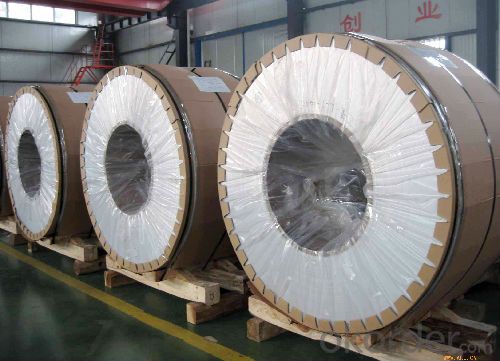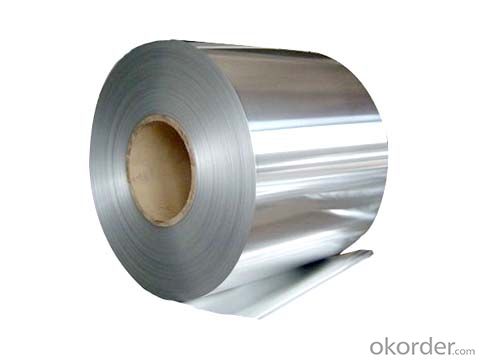AA8079 aluminium coil
- Loading Port:
- China Main Port
- Payment Terms:
- TT or LC
- Min Order Qty:
- -
- Supply Capability:
- -
OKorder Service Pledge
OKorder Financial Service
You Might Also Like
1、 Structure of Aluminium Coil Description
Disposable aluminum Coil air food boxes is able to endure high low temperature (20-250) molecular structure stability don't change packing materials. Compared with the current widespread use of plastic snack box can only carry temperature range is - 16 to 85, it can take food from refrigerator to oven to table, and do not need to change container.
2、Main Features of the Aluminium Coil
Alloy: | A1100, A3003, A3004, A5005, A8011 etc. |
Temper | H14, H16, H18, H24 etc. |
Thickness | From 0.024mm to 1.2mm |
Width | From 56mm to 1600mm |
Color | Customized, you can choose from our color chart, or we adjust the special color as the samples you offer. |
Coating | PE coating, PVDF coating, Back coating |
Coating thickness: | 0.18mm for PE coating, 0.25mm for PVDF coating |
3、 Aluminium Coil Images


4、Aluminium Coil Specification
Alloy: | A1100, A3003, A3004, A5005, A8011 etc. |
Temper | H14, H16, H18, H24 etc. |
Thickness | From 0.024mm to 1.2mm |
Width | From 56mm to 1600mm |
Color | Customized, you can choose from our color chart, or we adjust the special color as the samples you offer. |
Coating | PE coating, PVDF coating, Back coating |
Coating thickness: | 0.18mm for PE coating, 0.25mm for PVDF coating |
5、FAQ of Aluminium Coil
a. What is monthly capacity
---CNBM is one stated own company and our monthly capacity is about 2000tons.
b. Now which countries do you export your goods?
----Now we export to South East Asia,Africa, North America,South America ect.
- Q:What is the typical thickness of aluminum coils?
- The intended use and application of aluminum coils can result in varying thicknesses. Generally, a range of thicknesses is accessible, spanning from 0.006 inches (0.15 mm) to 0.25 inches (6.35 mm). The specific thickness needed for a specific project or industry hinges on factors like desired strength, flexibility, and weight of the aluminum coils.
- Q:What are the different hardness levels of aluminum coils?
- There are various hardness levels of aluminum coils, which are classified based on the alloy and tempering process used during their manufacturing. The most common hardness levels for aluminum coils are: 1. Soft (O temper): This is the most malleable and ductile state of aluminum coils. They are highly formable and suitable for applications that require extensive shaping or bending. 2. Quarter Hard (H12 temper): Aluminum coils in this hardness level have undergone a slight cold-working process, which increases their strength and stiffness. They are less malleable than soft coils but still retain good formability. 3. Half Hard (H14 temper): Coils in this hardness level have undergone a moderate cold-working process, resulting in further increased strength and stiffness. They are less formable than quarter-hard coils but are ideal for applications that require higher strength. 4. Three Quarter Hard (H16 temper): Aluminum coils in this hardness level have undergone a more intensive cold-working process, making them even stronger and less formable than half-hard coils. They are suitable for applications that require high strength and minimal deformation. 5. Full Hard (H18 temper): Coils in this hardness level have undergone the most extensive cold-working process, resulting in maximum strength and minimal formability. They are commonly used in applications that require high structural integrity and resistance to deformation. It is important to note that the specific hardness levels available for aluminum coils may vary depending on the alloy and manufacturer. Additionally, different industries and applications may have specific requirements for hardness levels, so it is crucial to choose the appropriate hardness level based on the intended use of the aluminum coils.
- Q:What are the potential applications of coil-laminated aluminum coils?
- Coil-laminated aluminum coils have a wide range of potential applications in various industries. They can be used in the manufacturing of automotive parts, such as body panels and interior components, due to their lightweight yet durable nature. Additionally, they are suitable for building and construction purposes, including roofing, siding, and insulation, as they offer excellent corrosion resistance and thermal conductivity. Furthermore, coil-laminated aluminum coils find use in electrical industries for producing transformers, capacitors, and other electrical components due to their excellent electrical conductivity. Overall, their versatility and desirable properties make coil-laminated aluminum coils valuable in numerous applications across different sectors.
- Q:How are aluminum coils cleaned and maintained?
- Aluminum coils are typically cleaned and maintained by following a few key steps. Firstly, any loose debris or dirt should be removed using a soft brush or vacuum cleaner. Then, a mild detergent solution or a specialized coil cleaner can be applied to the coils, followed by gentle scrubbing with a soft brush to remove any stubborn dirt or grime. It is important to rinse off the cleaning solution thoroughly using a hose or pressure washer, ensuring no residue is left behind. Regular maintenance includes checking for any signs of damage or corrosion, and if required, applying a protective coating or lubricant to prevent future issues.
- Q:Can aluminum coils be used in the production of aluminum ceilings?
- Yes, aluminum coils can be used in the production of aluminum ceilings. The coils are typically processed and shaped into sheets, which are then used to create the ceiling panels.
- Q:Can aluminum coils be used in the production of cryogenic storage tanks?
- Yes, aluminum coils can be used in the production of cryogenic storage tanks. Aluminum is a suitable material for cryogenic applications due to its low density, high thermal conductivity, and excellent corrosion resistance. These properties make it ideal for storing and transporting cryogenic liquids such as liquid nitrogen, oxygen, and argon. Aluminum coils can be used to fabricate the inner shell of the storage tank, providing a lightweight and durable solution. Additionally, aluminum is easily formable, allowing for the creation of complex tank shapes and designs. However, it is important to note that aluminum has a higher coefficient of thermal expansion compared to other materials like stainless steel, so proper design considerations must be taken to accommodate for thermal contraction and expansion during cryogenic operations.
- Q:What are the potential environmental impacts of aluminum coil production?
- The potential environmental impacts of aluminum coil production can be classified into several categories. Firstly, the extraction of aluminum from bauxite ore requires significant energy inputs and can contribute to greenhouse gas emissions. The process also involves the use of toxic chemicals, which if not properly managed, can contaminate nearby water sources and soil. Furthermore, the manufacturing of aluminum coils involves various stages such as smelting, rolling, and annealing, each of which has its own environmental implications. Smelting, for example, releases air pollutants like sulfur dioxide, nitrogen oxides, and particulate matter, contributing to air pollution and potentially causing respiratory issues for nearby communities. Additionally, the rolling process consumes a significant amount of electricity, which may be derived from fossil fuel sources, leading to further greenhouse gas emissions. The use of water in cooling and cleaning processes can also strain local water resources if not properly managed. Transportation is another factor to consider. Aluminum coils are often transported over long distances, which can contribute to carbon emissions from the burning of fossil fuels in trucks or ships. Lastly, the disposal of waste generated during the production process, such as scrap metal or chemicals, needs to be carefully managed to prevent pollution of landfills or nearby ecosystems. To mitigate these potential environmental impacts, companies can adopt various strategies. These include investing in more energy-efficient technologies, promoting recycling and circular economy principles to reduce the need for primary aluminum extraction, implementing cleaner production techniques, and ensuring proper waste management and pollution control measures are in place.
- Q:Can aluminum coils be used for signage purposes?
- Yes, aluminum coils can be used for signage purposes. Aluminum is a versatile and lightweight material that is commonly used in the signage industry. It has excellent corrosion resistance, making it suitable for both indoor and outdoor applications. Aluminum coils can be easily cut and formed into various shapes and sizes, allowing for customizable signage designs. Additionally, aluminum is highly durable and can withstand harsh weather conditions, making it a long-lasting option for signage. The coils can be painted or coated with different finishes to achieve the desired aesthetic appeal, while also providing protection against fading and scratching. Overall, aluminum coils are a popular choice for signage purposes due to their versatility, durability, and aesthetic appeal.
- Q:Can aluminum coils be customized to specific requirements?
- Yes, aluminum coils can be customized to specific requirements. Aluminum coils are highly versatile and can be tailored to meet a wide range of specifications and applications. Customization options include the choice of alloy, thickness, width, and length of the coil, as well as various surface treatments such as coatings, finishes, and embossing. Additionally, aluminum coils can be customized in terms of mechanical properties, such as strength, flexibility, and corrosion resistance, to suit specific needs. The customization process involves working closely with manufacturers or suppliers who have the expertise and facilities to meet the desired requirements. Whether it's for the aerospace industry, automotive sector, construction projects, or any other application, aluminum coils can be customized to meet specific requirements and deliver optimal performance.
- Q:What are the different grades of aluminum used in coils?
- There are several different grades of aluminum commonly used in coils, including 1100, 3003, 5052, and 6061. Each grade has its own unique characteristics and properties, making them suitable for different applications. For example, 1100 aluminum is known for its excellent corrosion resistance and high thermal conductivity, making it ideal for heat exchangers and fins. On the other hand, 5052 aluminum offers good formability and moderate strength, making it commonly used in automotive and marine applications. Lastly, 6061 aluminum is a versatile grade with excellent strength-to-weight ratio, making it suitable for structural components and aerospace applications.
1. Manufacturer Overview |
|
|---|---|
| Location | |
| Year Established | |
| Annual Output Value | |
| Main Markets | |
| Company Certifications | |
2. Manufacturer Certificates |
|
|---|---|
| a) Certification Name | |
| Range | |
| Reference | |
| Validity Period | |
3. Manufacturer Capability |
|
|---|---|
| a)Trade Capacity | |
| Nearest Port | |
| Export Percentage | |
| No.of Employees in Trade Department | |
| Language Spoken: | |
| b)Factory Information | |
| Factory Size: | |
| No. of Production Lines | |
| Contract Manufacturing | |
| Product Price Range | |
Send your message to us
AA8079 aluminium coil
- Loading Port:
- China Main Port
- Payment Terms:
- TT or LC
- Min Order Qty:
- -
- Supply Capability:
- -
OKorder Service Pledge
OKorder Financial Service
Similar products
New products
Hot products
Related keywords




























